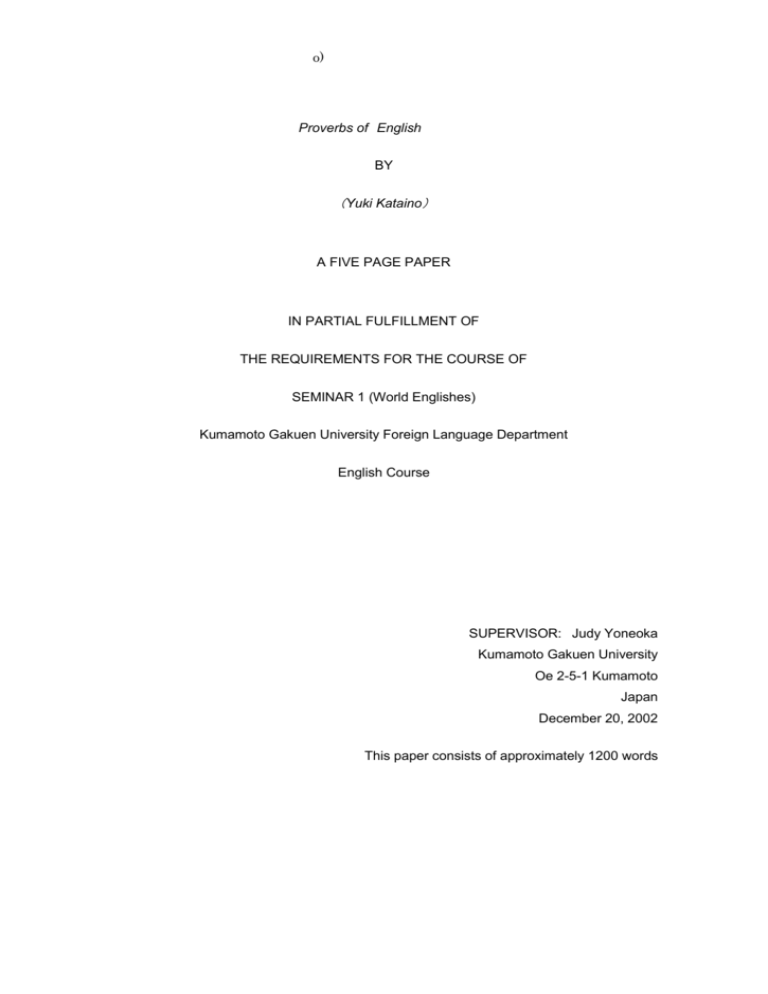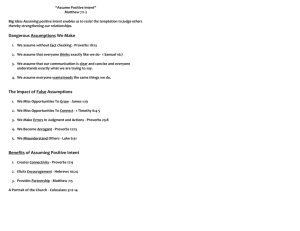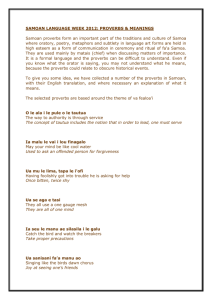Animal Proverbs in Japanese and English (Yuki Kataino)
advertisement

o) Proverbs of English BY (Yuki Kataino) A FIVE PAGE PAPER IN PARTIAL FULFILLMENT OF THE REQUIREMENTS FOR THE COURSE OF SEMINAR 1 (World Englishes) Kumamoto Gakuen University Foreign Language Department English Course SUPERVISOR: Judy Yoneoka Kumamoto Gakuen University Oe 2-5-1 Kumamoto Japan December 20, 2002 This paper consists of approximately 1200 words o) Abstract There are a lot of English proverbs similar to those in Japanese. Proverbs are a part of everyday language even if we don’t use them everyday. Many of the proverbs that we use in English are actually quotations from the Bible or famous writers like Shakespeare. These express feeling of joy, sorrow and grief and so on, as in Japanese. This paper will research the common denominator and various differences between Western and Japanese proverbs. 1. Introduction There are many proverbs in the world, and ones have the wisdom of the ancients and salutary lessons of Japan, China and Western people in each short phrase. We sometimes speak them lightly to express our feelings of joy, sorrow and lamentation briefly. However we don’t know how these are made, how many and what kind of proverbs exist. So this paper classified two interesting types that are “Proverbs using animals”, “Cat” and “Dog”. 2. Body There are various proverbs of using animal all over the world. The following tables shows two kinds of animal, dog and cat, proverbs in English and Japanese. ① Cat Proverbs <English> a. Curiosity killed the cat. (気苦労は猫をも殺す) c. When the cat is away, the mice will play. (Nekoga inaito nezumiga abareru.) <Japanese> b. 「Shinpaiha mino doku.」 (気 苦労は命取りになること) d. 「Onino inumano sentaku.」 (思う 存分心をくつろげること)「Torinakisato no koumori.」 e. A cat has nine lives. (Nekoni inotiga kokonotuaru.) g. He sets the fox to keep the geese. (Kituneni gatyouno banwo saseru.) f. 「Nekoniha kyuusei.」 (容易 に死なない) h. 「Neko ni katuobusi.」 (好物 を近くに置いては油断のならないこと) o) i. Caviar to the general. j. (高級すぎて大衆にはわからないもの) 「Neko ni koban.」 (価値あるものでも持つ人によって何の 役にも立たないこと) k. Cats hide their claws. l. 「Nouaru takaha tumewo kakusu.」 (本当に実力のあるものは、やたらにそ (nekoha tumewo kakusu.) れを現さないものだということ) ②Dog proverbs m. Give a dog a bad name and hang him.(inuni n. omeiwo ataete shasatu seyo) o. Teach a dog to bark. (Inuni hoerukotowo oshieru.) (軽々しく人の悪口を言うことは慎むべ きだということ) p. 「Shaka ni sekkyou.」 (よく 知っている者になお教えること。説く必 要のないたとえ) q. Let a sleeping dog lie. (Neteiru inuha nekaseteoke.) r. 「Sawaranukamini tatarinashi.」 (物 事に関係しなければ、禍を招くことはな いこと) s. A flying crow always catches something. t. 「Inumo arukeba bouni ataru.」 (物事 ( Tondeirukarasuha itumo を行うものは、時に禍に合う。また、やっ nanikawotoraeru.) てみると思わぬ幸いにあうこと) u. Cat - and - dog. (kennen no naka.) v. 「Kenen no naka.」 (犬と猿。互いに仲が悪いこと) “Cat” and “Dog” are often used for bad meaning in proverbs. English proverbs with dogs have cruel images like kill, strike and fling a stone. And originally “dog” means spy or sordid. 「犬も歩けば棒に当たる(Inumo arukeba bouni ataru)」, a Japanese proverb, also originally means “a dog which anything doesn’t do bad thing is to be struck with a stick.” One reason that dogs appear as bad animals is that they are violent and humble in the Bible. The second reason for the difference between Japanese and English proverbs with dogs is that in English, dogs are considered domestic animals, while Japanese dogs o) are considered free or independent animals. There are many bad meaning idioms with dogs in English as well. for example: a dirty dog「ひどい野郎」, a lazy dog「怠け者」, a dog’s chance 「わずかな見込み」, die a dog’s death「みじめな死に方をする」. But on the other hand, in Japanese proverbs (p,r), dogs are expressed using the words “shaka” or “kami” (Buddha or god). The usage is not as religious as usual “shaka” or “kami”, but its difference of expression is so interesting. Turning to cats, we see there are different animal words used in same meaning proverbs like cat - bat (c-d), cat - hawk (k-l). It’s quite strange and these to reflect each cultural background or customs towards cats and other animals. On this topic, Okutu (1994, p.160) stated, “While cats have been sacred animals since ancient Egypt, they are considered diabolic. And also, cats are considered more impudent and stronger than dogs.” Especially interesting is the difference between English and Japanese, in proverbs (u,v). Because, the Japanese proverb : 「犬猿の仲」 was translated using “cat” in instead of “monkey”. That’s a very interesting difference, which appears to be based on culture. 3. Conclusion The more I research about animal proverbs, the more I feel that there are many proverbs which express discrimination or dirtiness towards dogs and cats. It may reflect the background of the period proverbs come from. However proverbs are beneficial expressions. They are convenient when we talk about something hard to put into words. Although every country is different, similar proverbs appear in English and Japanese. There are two reasons for this: (1) every country’s culture (i.e. human culture) also has many common aspects, and (2) cultural exchange promotes spreading of new ideas. The difference between English and Japanese proverbs is merely that the material differs by culture. Proverbs are fossils of thought or customs, so we can compare our cultures to cross age or border barriers. <Bibliography> Akimoto, Hirosuke.(2000) “Eigono kotowaza” Osaka: Sougensha Mitoma, Naomitsu.(1997) “Kokusaikaha eigono kotowazakara” Kokubunji: Shinfusha o) Okuta, Fumio.(1994) “Eigono kotowaza” Tokyo: Nihon Jitugyou Syuppansya. “English Course of Yoshio Hayashi.” Available at; http://www6.plala.or.jp/yhayashi/ the last day, 16/12/2002 “English Expression Dictionary.” ( Eigo hyougen jiten ) Available at; http://home.alc.co.jp/db/owa/ehj_idx “English Proverbs Instruction Dictionary.” (Eigo kotowaza kyoukun jiten.) Available at; http://www2.starcat.ne.jp/~kuniando/, 20/11/2002 “English Workbook..” Available at; http://www.aimrun.com/proverbs.shtml “Tea Time.” Available at; http://www.geocities.com/Heartland/Acres/7288/, 16/12/2002 “Words of Wisdom OK 312.” Available at; http://www.ok312.com 16/12/2002







